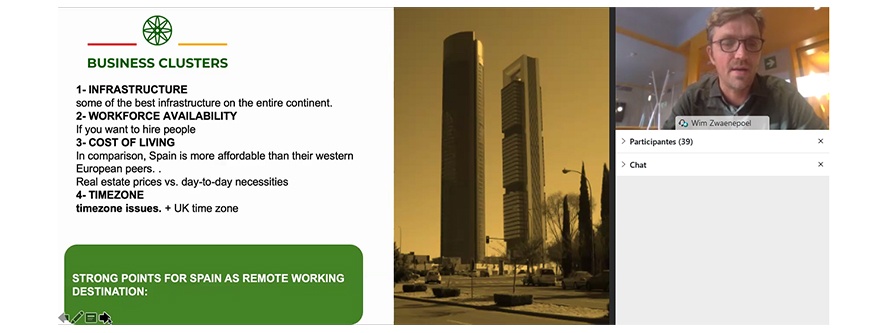Webinar on “Spain as remote working destination”
Last October 13th, the Official Spanish Chamber of Commerce in Belgium and Luxembourg organized a Webinar on “Spain as a destination for teleworking“, in collaboration with Business Cluster, a group of companies formed by Euro Economics, AgioGlobal, MADSkills, Quintessence and with the participation of EPS, IFAS and Modern Nomads. The Webinar was held by Wim Zwaenepoel, lecturer at the IE Business School and consultant at Netexpat, and by Jeroen Oskam, founding partner of Euro Economics.
To begin with, during this Webinar the lecturers presented some general data on the impact of the Covid-19 on Spanish society, and specifically, the impact that the health crisis has had on the economic and labour fields. The trends of telework in Spain before the Covid-19 were explained, as was its evolution until today, in addition to the forecasts that analysts estimate about this modality of work in the future. Additionally, the economic and labour policies adopted by the Spanish authorities to try to mitigate the negative effects of the Covid-19 were reviewed.
Moreover, the speakers focused on analysing, in second place, the so-called “STEM” sector (“Science, Technology, Engineering and Mathematics”), highlighting the growing lack of technical workers in the Benelux countries. On the other end is Spain, where there is a large pool of STEM sector professionals with excellent technical training. In the Webinar, a vision of the possibilities offered by the different modalities of teleworking in Spain was presented as a way to overcome the lack of specialized STEM personnel in the Benelux.
Thirdly, the emerging trend called “new nomads“ was introduced, referring to professionals from the Benelux who are moving their workplace to Spain thanks to the advances in the implementation of teleworking. The speakers highlighted the many benefits of this new way of working and its advantages, such as a lower tax burden or a lower cost of living. An example of this trend is the Canary Islands, where more and more foreigners are choosing to work remotely while having settled in the archipelago. The speakers emphasized the attraction of Spain as a territory from which to work remotely, due to its infrastructure, connectivity, and availability of resources, among others.
Finally, our speakers addressed the legal and tax implications of this practice of teleworking from Spain for workers in the Benelux countries, pointing out several possible alternatives, both for employees and for freelance.
After the presentation, some time was spared for a round of questions, in which the attendees raised several questions to the speakers. These questions dealt with the tax implications for those Benelux workers whose stays in Spain are less than the 183 days established by tax regulations, or everyday issues to take into account when choosing to work remotely from Spain, such as having a private health insurance for greater security.
From the Official Chamber of Commerce of Spain in Belgium and Luxembourg, we would like to thank Business Cluster for its presentation, as well as all the attendees for their presence.
In collaboration with:


